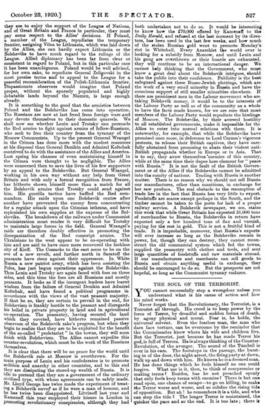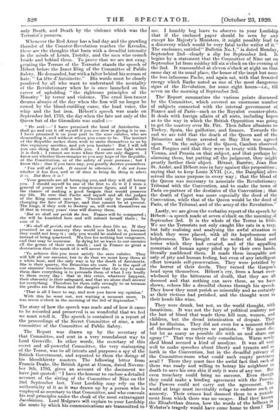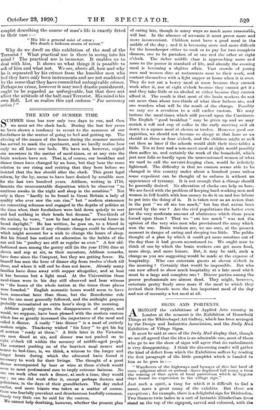THE SOUL OF THE TERRORIST.
yOU cannot successfully stop a wrongdoer unless you understand what is his cause of action and how his mind' works.
Never' forget that the Revolutionary, the Terrorist, is a Terrorist all through. His creed is to keep, power by the force of Terror, by dreadful and. sudden forms of death, by agony physical and moral. Fear is, he holds, the universal solvent. Even the fearless man; the man who dare face torture, can be overcome by the reminder that the Commissaries know where his wife and children live. But the Terrorist, just because he has made Terror his god, is full of Terrors. He is always thinking of the Counter- Revolution, of the avenger. The sound of- the Tumbril is ever in his ears. The footsteps in the passage, the burst- ing in of the door, the night arrest, the firing party at dawn, walk up and down with him. He knows he is a doomed man. He has done things which he feels himself• no one could forgive: What use is it, then, to think of compromise or making. terms? Besides, has he not preached openly that only fools keep terms with enemies? There is but one road open, one chance of escape—to go on killing, to make the Terror worse and worse, and so subdue the rising tide of opposition. But ah 1 he remembers it is a tide, and who can stop the tide ? The longer Terror is maintained, the quicker the pace and so the end. It is too late ; there is
only Death, and Death by the violence which was the Terrorist's panacea.
Whenever the Red Army has a bad day and the growling thunder of the Counter-Revolution reaches the Kremlin, these are the thoughts that burn with a dreadful intensity in the minds of Lenin, Trotsky, and the men who crouch beside and behind them. To prove that we are not exag- prating the Terrors of the Terrorist stands the speech of Hebert before the Inner Ring of the Committee of Public Safety. He demanded, but with a falter behind his scream of hate, La tete d'Antoinette." His words must be closely pondered by all who want to understand the mentality of the Revolutionary when he is once launched on his career of upholding " the righteous principles of the Minority " by terror and violence. The cruel lion-tamer dreams always of the day when the lion will no longer be cowed by the blood-curdling curse, the loud voice, the whip and the hot iron. Hebert's speech was made on September 3rd, 1793, the day when the fate not only of the Queen but of the Girondists was sealed :— " lie said :—' I have promised the head of Antoinette. I shall go and cut it off myself if you are slow in giving it to me. I have promised it on your part to the saner culottes, who are demanding it, and without whom you cease to be. The instinct of the Republic makes them wish to smite themselves to us by this expiatory sacrifice, and yet you hesitate ! But I will tell you one thing that will decide you. I cannot see light where it is dark ; I cannot see roses when there are only daggers. I know not whether there remains to you any hope of the Republic, of the Constitution, or of the safety of your persons ; but I know this : that if you have any, you greatly deceive yourselves.
You will all perish. It cannot be otherwise. I do not know whether it has been well or. ill done to bring the thing to where it is. But there it is !
' Your generals are all betraying you, and they will all betray you. I should myself be one of the first to do it if I wore a general of yours and a less conspicuous figure, and if I saw the chance of making a good bargain that would preserve my life. Be sure that Pache and myself and all the judges of the King cannot save her. 'Twould only bo possible by changing the face of Europe, and that cannot be at present. The kings, if they seek to destroy us, will work themselves an ill that in twenty years' time will destroy them.
• But we shall not perish the less. France will be conquered ; she will be humbled here and will submit herself there ; be BUM of it.
' We shall all perish, and those who hare done like us. If they promised us an amnesty they would not hold to it, because they could not keep it ' • only you would be stabbed or poisoned instead of being quartered. We live for nothing but vengeance, and that may be immense. In dying let us leave to our enemies all the germs of their own death ; and in France so great a destruction that the mark of it will never die.
`To achieve this you must satisfy the sans culottes. They will kill all our enemies, but to do that we must keep them at a white heat, and the only way is by the death of Antoinette. She is their quarry, the Brissotins are ours. It is the spoil of our enemies' treasure-house. Remember that the way to make them dare everything is to persuade them of what I cry loudly to them every day : that m this crisis, whatever happens, their obscurity is their safeguard, and that we alone shall answer for everything. Therefore let them rally strongly to us because the profits are for them and the dangers ours.
'That is all I have to say, and now you know my opinion.' With this he went out, not waiting a moment more. It was seven o'clock in the morning of tho 3rd of September."
The story of how the speech was made and of how it came to be recorded and preserved is so wonderful that we feel we must retell it. The speech is contained in a report of the proceedings of the Secret Committee of nine, a sub- committee of the Committee of Public Safety.
The Report was drawn up by the secretary of that Committee, and sent in a very roundabout way to Lord Grenville. In other words, the secretary of this secret and all-powerful Committee, the very mainspring of the Terror, was to all intents and purposes a spy of the British Government, and reported to them the doings of his bloodthirsty masters. The following letter from Francis Drake, the British Agent at Genoa, dated Novem- ber 9th, 1793, gives an account of the document we have just quoted: "I have the honour to enclose a detailed account of the sitting of the Committee of Nine on the 2nd September last. Your Lordship may rely on the authenticity of it as it was drawn up by a person who is employed as secretary to that Committee, and who conceals his real principles under the cloak of the most extravagant Jacobinism. Lord Mulgrave will explain to your Lordship the route by which his communications are transmitted to
me. I humbly beg leave to observe to your Lordship that if the enclosed paper should be seen by any except his Majesty's Ministers, it might possibly lead to a discovery which would be very fatal to the writer of it." The enclosure, entitled" Bulletin No.1," is dated Monday, September 2nd—clearly a slip for September 3rd. it begins by a statement that the Committee of Nine sat on September 1st from midday till six o'clock on the evening of the 2nd. It reassembled at eleven o'clock at night on that same day at its usual place, the house of the inept but none the less infamous Pache, and again sat, with that frenzied energy which Burke noted as one of the most dangerous signs of the Revolution, for some eight hours—i.e., till seven on the morning of September 3rd.
The Report summarizes the various points discussed by the Committee, which covered an enormous number of subjects connected with the internal government of France and of Paris--such as the Royalist counter-plots. It deals with foreign affairs of all sorts, including hopes as to the way in which the British Opposition was going to get the mastery over Mr. Pitt. Then follow allusions to Turkey, Spain, the guillotine, and finance. Towards, the end we are told that the death of the Queen and of the Brissotins and those arrested on May 31st was agreed upon. " On the subject of the Queen, Cambon observed that Forgues said that they were in treaty with Brussels, Vienna, and Prussia on that subject, and that perhaps by alarming them, but putting off the judgment, they might greatly further their object. Heraut, Barrere, Jean Bon St. Andre, and Hebert rose in fury against this proposition ; saying that to keep Louis XVII. [i.e., the Dauphin] alive served the same purpose in every way ; that the blood of the Queen was necessary to associate the Revolutionary Tribunal with the Convention, and to make the town of Paris co-partner of the destinies of the Convention ; that the death of Capet was more especially the deed of the Convention, while that of the Queen would be the deed of Paris, of the Tribunal, and of the army of the Revolution."
Lastly, we are given the verbatim report of the speech by Hebert—a speech made at seven o'clock on the morning of September 3rd. It is the whole of the Terror in little. We see the Terrorists not only caught like rats in a trap, but fully realizing and analysing the awful situation in which they were placed, with all its hopelessness and helplessness. The thought of the welter of blood and terror which they had created, and of the appalling mountain of human agony piled up by their own hands, literally maddened them. It made them incapable not only of pity and human feeling, but even of any intelligent effort towards self-preservation. They were petrified by the horror of their deeds. They turned the Gorgon's head upon themselves. Hebert's cry, from a heart over- whelmed by the bitterness of death, that they are all doomed and that nothing can save them, as we have shown, echoes like a dreadful chorus through his speech. They knew they must perish as miserably and as certainly as their victims had perished, and the thought went to their heads like wine.
They were drunk, but not, as the world thought, with fanaticism. It was not the fury of political zealotry not the lust of blood that made them kill men, women, and children, but the dread intoxication of despair. Thee had no illusions. They did not even for a moment think of themselves as martyrs or patriots. " We must die, but let as many as possible die with us and share our agony ! " That was their only consolation. Warm newly shed blood seemed a kind of anodyne. It was all very well to make speeches about liberty and tyrants and so forth in the Convention, but in the dreadful privacy of the Committee-room what could such empty pretences avail ? There they must face the awful fact that each of them was ready and willing to betray his neighbour to death to save his own skin if only it were of any use. But even treachery could bring no succour. Even though they could make a binding agreement with the Powers, the Powers could not carry out the agreement. The world at large must inevitably refuge to endorse such en amnesty. Their crimes had doomed them to a Punish' mcnt from which there was no escape. had they lanY'v.n the Elizabethan drama, how the words of the bellman is Webster's tragedy would have come home to them! The
couplet describing the course of man's life is exactly fitted to their case :-
" His life a general mist of error ;
His death a hideous storm of terror."
Why do we dwell on this exhibition of the soul of the Terrorist ? What practical use is there in seeing into his mind ? The practical use is immense. It enables us to deal with him. It shows us what things it is possible to ask of him and what not. We see, above all, how and why he is separated by his crimes from the humbler men who feel they have only been instruments and are not maddened by the sense that they have committed unforgivable crimes. Perhaps no crime, however it may need drastic punishment, ought to be regarded as unforgivable, but that does not affect the attitude of the half-mad Terrorist. His mind is his own Hell. Let us realize this and endorse " For necessary action ! "




































 Previous page
Previous page